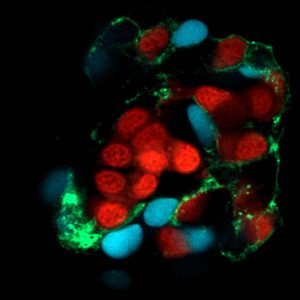Islet regeneration and coordination via Ca2+ waves – across species (Dresden)
Posted by NikolayNinov, on 12 October 2022
Location: Center for Regenerative Therapies Dresden
Closing Date: 1 November 2022
Research focus: To develop a therapy for Type 1 diabetes, we aim to understand the molecular and cellular events required for the regeneration of insulin-producing β-cells. We focus on the signals that promote the formation of functional β-cells in the body via processes of cell-fate conversion, stem-cell plasticity and integration of the cells into functional and coordinated electrical networks, which is essential for efficient regulation glucose homeostasis. As a principal model, we use the zebrafish, which we have shown can naturally recover from diabetes via cell regeneration. We follow up on our discoveries from zebrafish using mammalian and human pancreas tissue-samples to identify conserved mechanisms of beta-cell biology and regeneration across species.
Research project: We have identified a critical subpopulation of β-cells present in both the zebrafish and the mouse pancreas, called leader cells, which initiate glucose-stimulated Ca2+ waves and act as islet-pacemakers. We showed that when leader cells are selectively deactivated or ablated, the function of the whole β-cell population is abrogated due to loss of Ca2+ waves. We want to explore the role of leader cells in diabetes pathogenesis and beta-cell regeneration.
Specific questions to be studied: What signaling mechanisms define which β-cells will become leaders and which ones followers? Are leader cells stable in time or do they alternate with non-leader cells? Can leader-cells undergo selective loss of dysfunction under conditions of diabetes? Can leader cells regenerate and what are the molecular markers of a leader cell? How do leader cells communicate with the rest of the islet cells to control their activity?
To address these questions, the project will combine optogenetic systems with Ca2+ imaging in the intact pancreas of the translucent zebrafish. This technology allows to selectively activate or deactivate individual islet cells by shining light on them while studying the effects on the whole network of cells, including α-cells (glucagon-producing) and δ-cells (somatostatin-producing).

What we offer: We will provide support for scientific networking, training in leadership and grant-writing, as well as attendance of international conferences and in teaching. In addition, the trainee will be integrated within the Paul Langerhans Institute Dresden, part of the larger multi-institutional German Center for Diabetes Research (DZD), which provided excellent opportunities for career networking in the field of metabolism, attendance of scientific workshops and establishment of new collaborations. The successful candidate will also be embedded in a very rich scientific environment at the Center for Molecular and Cellular Bioengineering (CMCB), part of the Technische Universität Dresden. The research on campus is highly interdisciplinary and addresses topics spanning cell biology, genomics, biophysics, tissue engineering, bioinformatics, and regeneration. We combine these approaches to bridge the gap between fundamental research and clinical therapies.
Papers of interest:
A single-cell atlas of de novo β-cell regeneration reveals the contribution of hybrid β/δ cells to diabetes recovery in zebrafish.
Development 149(2):dev199853 (2022)
Leader β cells coordinate Ca2+ dynamics across pancreatic islets in vivo.
Nature Metabolism 1, 615–629 (2019)
For more details and submission of applications follow:
https://www.nature.com/naturecareers/job/research-associate-phd-student-postdoc-mfxpancreatic-islet-regeneration-and-coordination-via-ca2-waves-in-dresden-technische-universitat-dresden-tu-dresden-764735
Closing Date: 1 November 2022
Scientific fields: Cell fate control and differentiation, Development and disease, Metabolism and physiology, Regeneration, Signalling, Stem cells
Model systems:
Duration: Fixed term

